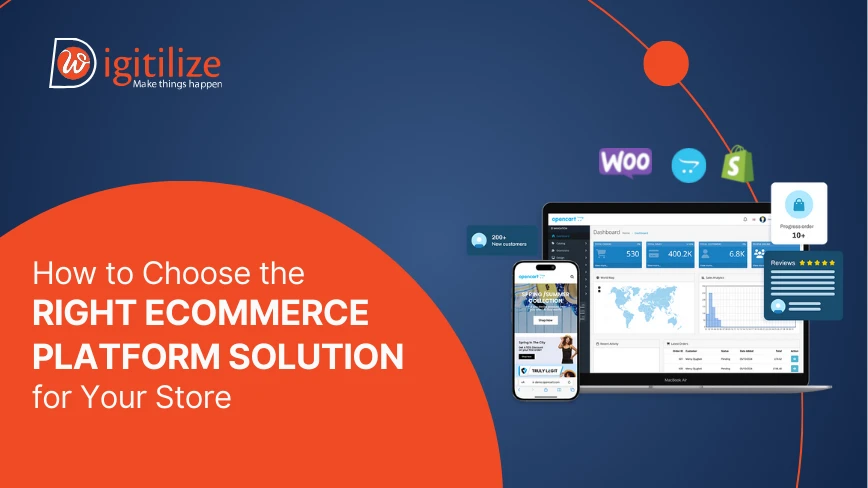How to Choose the Right Ecommerce Platform Solution for Your Store

There is more to developing an
ecommerce platform solutions than merely posting your product listings online. You won’t believe how difficult that is. Different types of businesses require different features and capabilities from their ecommerce systems.
Guide to choosing ecommerce software for your company might be challenging because there are so many ecommerce platforms that appear to provide comparable features. We are discussing a few key considerations below to make it easier for you to select the best platform for your ecommerce business.
Selecting an ecommerce platform for your business
Picking an ecommerce platform for startups is not so much a technical choice as it is a strategic one. It all comes down to matching the platform’s features to your target market, objectives, and business requirements. With
key factors in ecommerce platform selection, we’re making things simple for you.
· Avoid Choosing Cheap Ones
It’s crucial to consider factors other than pricing when selecting an e-commerce platform. Cost is important, but don’t let it be your sole consideration. Choosing a low-cost platform that is unable to meet the demands of your company is like choosing a leaky boat—it will not get you where you’re going.
· Look for the Inventory Management System.
We cannot overstate how crucial inventory management is—it truly has the power to make or ruin your company. A strong inventory management system on an ecommerce platform is the first step towards avoiding the hassles of an expensive transition. It notifies you when it’s time to place a new order and allows you to keep track of how many items are in your stock. Orders, restocks, and upcoming sales requirements are also tracked by it.
· Integrated analytics and data monitoring
Internal data analysis and ecommerce are two of the main advantages of using an e-commerce platform. Every stage of the purchasing process on e-commerce websites generates a huge amount of data. The customer data, for example, keeps track of how many people visit your website, where they come from, what technology they use, how long they stay on it, and more.
· Integration of Google Merchant

For their products to appear in the appropriate Google Shopping results, merchants may submit and manage product information using Google Merchant. It increases traffic to the page where your products are listed. It is really helpful to have this function to contact clients outside of your website.
· Robust catalogue
The core of your inventory is your product catalogue. Verify that the catalogue is user-friendly and simple to update. Above all else, however, make sure the product catalogue satisfies your industry’s standards. For instance, your product catalogue has to have
ecommerce software features to consider that let customers choose a product’s size or colour if you are in the fashion or apparel industry. Cross-linking between product pages and product bundles are two more examples.
· Assistance and records
When problems occur or enquiries need to be addressed, first-rate customer service is crucial. Examine the platform’s resources, response times, and customer service choices. An active user community and comprehensive documentation can also help understand the functionalities of the platform and troubleshooting issues.
· The overall cost of ownership and the budget
One of the most important steps in selecting an ecommerce platform is assessing your budget. Don’t forget to factor in other charges like domain registration, hosting fees, transaction fees, and customization prices, even if the initial setup and monthly subscription costs are crucial. Making an informed choice will be aided by your comprehension of the overall cost of ownership.
When to invest in the best ecommerce solutions for online stores?

· Your Company Is Growing
As your company expands quickly, it becomes clear that using top
ecommerce solution options for businesses is essential. You can improve customer satisfaction, manage business operations, and handle growing demand by implementing the best ecommerce platform. An ecommerce platform may help you reach and interact with more prospective customers, as 56% of consumers say they prefer to purchase online.
It is well recognised that you may boost your earnings considerably by investing in an ecommerce platform. You may connect with a large consumer base that might not have otherwise been able to purchase your goods by attempting to sell online. A good platform may help you increase your client base, streamline the sales process, and provide your customers with a more convenient purchasing experience.
· You wish to expand your user base
An ecommerce platform allows you to expand your consumer base or user base globally. In the past 12 months, 57% of global internet buyers have made at least one purchase from a foreign firm.
· Meeting the Needs of Customers
The extent to which an ecommerce platform can satisfy the needs of your clients is an important factor to take into account when thinking about investing. Customers may buy goods or services conveniently thanks to these platforms, which are designed to make shopping easy and hassle-free. Additionally, professional-grade ecommerce systems include clear, eye-catching images that help users better understand the goods. Thankfully, you may hire professionals to handle the visual portion without breaking the bank.
Conclusion
Making the right choice for your online store’s
ecommerce platform will be the cornerstone of its future. Take some time to examine, contrast, and reconsider the features offered by each platform. Being unique is the key to ecommerce. If you have any challenges while choosing an ecommerce platform then contact DigitilizeWeb. We have delivered some amazing
ecommerce platform solutions that bring success to businesses. To know more you can check our case studies that can help you to know how we can help you. Contact us to know more.
 There is more to developing an ecommerce platform solutions than merely posting your product listings online. You won’t believe how difficult that is. Different types of businesses require different features and capabilities from their ecommerce systems. Guide to choosing ecommerce software for your company might be challenging because there are so many ecommerce platforms that appear to provide comparable features. We are discussing a few key considerations below to make it easier for you to select the best platform for your ecommerce business.
There is more to developing an ecommerce platform solutions than merely posting your product listings online. You won’t believe how difficult that is. Different types of businesses require different features and capabilities from their ecommerce systems. Guide to choosing ecommerce software for your company might be challenging because there are so many ecommerce platforms that appear to provide comparable features. We are discussing a few key considerations below to make it easier for you to select the best platform for your ecommerce business.
 For their products to appear in the appropriate Google Shopping results, merchants may submit and manage product information using Google Merchant. It increases traffic to the page where your products are listed. It is really helpful to have this function to contact clients outside of your website.
For their products to appear in the appropriate Google Shopping results, merchants may submit and manage product information using Google Merchant. It increases traffic to the page where your products are listed. It is really helpful to have this function to contact clients outside of your website.


